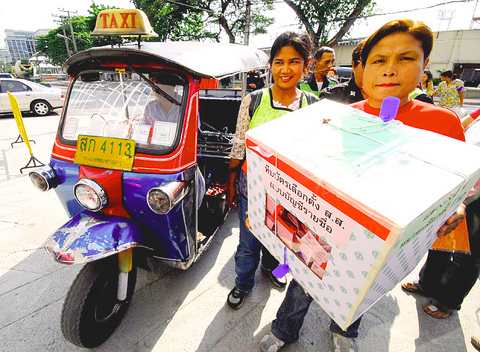Thailand went to the polls yesterday in a snap election called by the country's embattled prime minister, who urged voters to ignore an opposition boycott and end the country's deepening political stalemate.
But the vote was unlikely to satisfy critics who accuse Prime Minister Thaksin Shinawatra of corruption and abuse of power.
"People will not accept this election, and the political situation will get worse," said Banharn Silpa-archa, head of the opposition Chat Thai party, which boycotted the election along with the two other opposition parties in parliament.

PHOTO: EPA
The national police chief warned yesterday that the protests should stop after the vote.
"We should return to the rule of law after the election. Everybody should return to normal and not violate any laws or cause suffering to others," General Kowit Watana told reporters. "Police have been lenient for a very long time."
The balloting was largely peaceful, but bombs exploded after voting ended at three polling stations in the restive south, injuring four soldiers and a police officer, police said.
Thaksin called the election three years early to reassert his mandate after weeks of growing street protests against his leadership.
"I would like to congratulate all Thais that we have successfully maintained democracy," Thaksin said after yesterday's vote. "I would like to call on all sectors in society to respect the rules and respect the people's decision."
The results of unofficial exit polls were expected later yesterday, while official results were not expected until tomorrow, the Election Commission said.
Looking relaxed and smiling, Thaksin cast his ballot at a voting station near his residence in western Bangkok, accompanied by his three children.
The anti-Thaksin movement adopted the slogan "Vote for No Vote," and urged people to wear black on election day as a symbol of protest. A few people did don black but others staged more personal protests. Prominent political science professor Chaiyan Chaiporn of Chulalongkorn University made a show of ripping up his ballot card at a central Bangkok polling station, as other voters erupted in applause. He was promptly arrested but released on bail. The act is punishable by one year in prison, a 20,000 baht (US$500) fine and a five-year revocation of voting rights.

AIR SUPPORT: The Ministry of National Defense thanked the US for the delivery, adding that it was an indicator of the White House’s commitment to the Taiwan Relations Act Deputy Minister of National Defense Po Horng-huei (柏鴻輝) and Representative to the US Alexander Yui on Friday attended a delivery ceremony for the first of Taiwan’s long-awaited 66 F-16C/D Block 70 jets at a Lockheed Martin Corp factory in Greenville, South Carolina. “We are so proud to be the global home of the F-16 and to support Taiwan’s air defense capabilities,” US Representative William Timmons wrote on X, alongside a photograph of Taiwanese and US officials at the event. The F-16C/D Block 70 jets Taiwan ordered have the same capabilities as aircraft that had been upgraded to F-16Vs. The batch of Lockheed Martin

GRIDLOCK: The National Fire Agency’s Special Search and Rescue team is on standby to travel to the countries to help out with the rescue effort A powerful earthquake rocked Myanmar and neighboring Thailand yesterday, killing at least three people in Bangkok and burying dozens when a high-rise building under construction collapsed. Footage shared on social media from Myanmar’s second-largest city showed widespread destruction, raising fears that many were trapped under the rubble or killed. The magnitude 7.7 earthquake, with an epicenter near Mandalay in Myanmar, struck at midday and was followed by a strong magnitude 6.4 aftershock. The extent of death, injury and destruction — especially in Myanmar, which is embroiled in a civil war and where information is tightly controlled at the best of times —

China's military today said it began joint army, navy and rocket force exercises around Taiwan to "serve as a stern warning and powerful deterrent against Taiwanese independence," calling President William Lai (賴清德) a "parasite." The exercises come after Lai called Beijing a "foreign hostile force" last month. More than 10 Chinese military ships approached close to Taiwan's 24 nautical mile (44.4km) contiguous zone this morning and Taiwan sent its own warships to respond, two senior Taiwanese officials said. Taiwan has not yet detected any live fire by the Chinese military so far, one of the officials said. The drills took place after US Secretary

THUGGISH BEHAVIOR: Encouraging people to report independence supporters is another intimidation tactic that threatens cross-strait peace, the state department said China setting up an online system for reporting “Taiwanese independence” advocates is an “irresponsible and reprehensible” act, a US government spokesperson said on Friday. “China’s call for private individuals to report on alleged ‘persecution or suppression’ by supposed ‘Taiwan independence henchmen and accomplices’ is irresponsible and reprehensible,” an unnamed US Department of State spokesperson told the Central News Agency in an e-mail. The move is part of Beijing’s “intimidation campaign” against Taiwan and its supporters, and is “threatening free speech around the world, destabilizing the Indo-Pacific region, and deliberately eroding the cross-strait status quo,” the spokesperson said. The Chinese Communist Party’s “threats